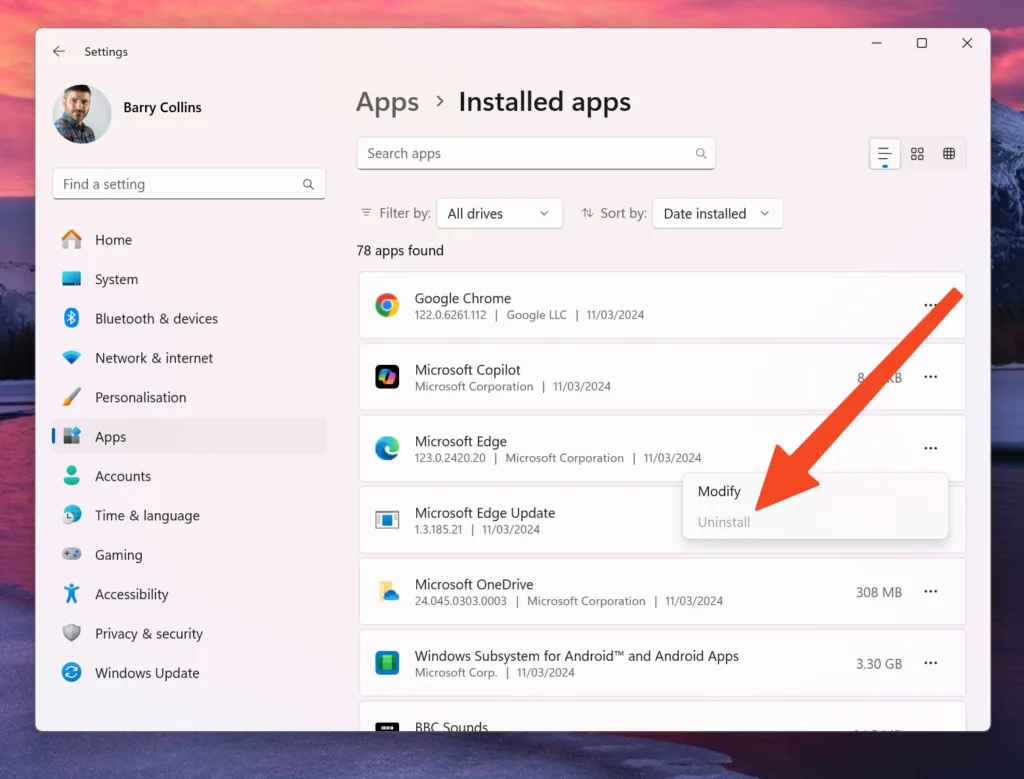
Watch out for these Windows 11 changes enforced by the EU
Microsoft has begun updating Windows 11 to comply with the EU’s Digital Markets Act (DMA), with some fundamental changes for European Windows users.
The most notable change is the option to uninstall the Edge browser from Windows 11. Until now, the option to uninstall Windows 11 on PCs has been greyed out, with Microsoft long arguing that a browser is an integral part of the operating system.

However, the company has seemingly found a way to disentangle the browser from the OS, with users now able to uninstall Edge from the “Installed apps” menu in Windows 11’s Settings.
The browser can reportedly be removed even if you don’t have an alternative browser installed. So what happens if you try and do something like click on a link in an email with no browser to open it? According to Chipp.in Tech, Windows 11 automatically redirects you to the Microsoft Store page for… the Edge browser. To be fair, the Store also contains rival browsers such as Brave, Firefox and Vivaldi, so you’re not railroaded down the Microsoft track.
Choice of widgets
The browser isn’t the only area of Windows 11 where the EU seems intent on offering more choice. The Bing web search feature on the taskbar can also be removed, and there’s now a mechanism for third-party developers to create their own replacements.
Likewise, it’s now possible for third parties to offer their own news feeds in the Widgets area. Microsoft has been incredibly ponderous in allowing third parties into the Widgets screen, with only a few select alternatives permitted to date. Whether opening it up now is enough to save such a little-used feature of Windows 11 is, frankly, doubtful.
One further change to the initial Windows 11 setup procedure might be regarded as something of a step backwards. As Microsoft explains in a blog post detailing its DMA changes: “Prior to the DMA, Windows automatically signed users into other Microsoft products and services that combined data, including into Edge, Bing, and the Microsoft ‘Start’ service (e.g. news, weather, etc.) when users are first signed into Windows.”
That will no longer be the case, with users forced to sign into each of these services individually if they wish to use them. We guess the EU is keen to prevent Edge from gaining advantages that aren’t open to other browser makers, even if it does inconvenience users to some degree.
Will Windows 11 changes affect the UK and the rest of the world?
The changes listed above will be applied as Windows updates to systems in the European Economic Areas (EEA). That includes the 27 EU countries, plus Iceland, Liechtenstein and Norway, who are in the single market.
The changes will not take effect in the UK. That mirrors a similar situation with Apple, which is being forced to allow third-party app stores in the EU but is not extending those same rights to iPhone owners in the UK, USA or other parts of the world.
Recommended reading
- With AR Genie and augmented reality, what you see is what you fix
- Top tech companies in Oulu, Finland
- Bruno Garcia, Managing Consultant at frog: “Nothing survives a lack of good feedback”
NEXT UP

Slow buyers cause tech firms to rethink sales approaches as tough Q1 hits home
New research suggests tech sales were slow in Q1, with buyers of technology and professional services taking their time before committing to any solutions.

ByteDance says it has no plans to sell TikTok and refuses to bow to US pressure
ByteDance, the Chinese company that owns TikTok, stated that it “doesn’t have any plans to sell TikTok” on Toutiao, a social media platform that it also happens to own.

Solace Kidisil, Group COO of Nsano: “The difference between traditional finance and fintech is the questions we ask”
We interview Solace Kidisil, Group COO of Nsano, a fintech company from Ghana, offering digital payment solutions across Africa